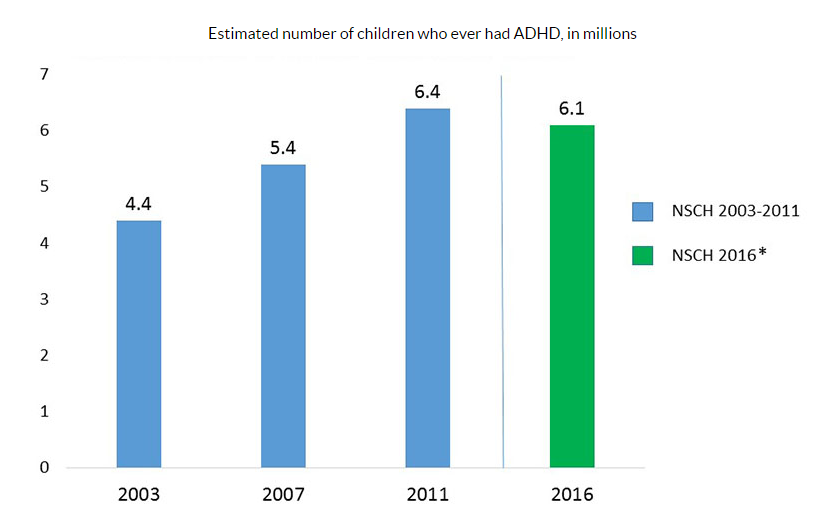ADHD is a developmental disorder that is diagnosed in early childhood. It is often seen in children around age 5 or 6 and can last into adolescence and adulthood in about 50 percent of cases. It is the most common psychiatric disorder in children and the most studied. In the United States, approximately 5 to 7 percent of children are diagnosed with ADHD. However, scientists are still unsure of exactly what causes ADHD, but are honing in on a combination of genetic and environmental triggers.
Symptoms of ADHD
As is indicated by the name, hyperactivity is one of the most significant symptoms of ADHD. Hyperactivity can include restlessness, the inability to focus and impulsiveness. Other symptoms include being bored with a task after a few minutes, lack of organizational skills, nonstop talking, trouble sitting still during quiet tasks, easily confused, difficulty following instructions, ignoring other speakers and impatience. Delays in normal development, such as speech and motor skills, may also be a symptom. Anger and frustration issues are also common in children with ADHD.
Social skills often suffer in children with ADHD and they are less likely to form lasting friendships and more likely to struggle with social rejection. Because many children and teens with ADHD encounter negative social interaction, many develop issues with anxiety, depression, anger management, learning disabilities and substance abuse problems. Parents who may notice similar symptoms should educate themselves on what to look for with ADHD so that they can schedule early intervention to minimize any negative impacts.
ADHD and Other Conditions
ADHD is often diagnosed along with other conditions, and research demonstrates that children with ADHD are at a greater risk of developing these other conditions. Common conditions associated with ADHD include:
- Oppositional defiant disorder (which occurs approximately 50 percent of all ADHD cases) is when children demonstrate antisocial behaviors like tantrums, deceit, aggression and defiance to authority.
- Anxiety (from social anxiety to separation anxiety) is extremely common in children and teens with ADHD.
- Obsessive compulsive disorder (also known as OCD) shares many symptoms with ADHD and can occur along with the condition.
- Sleep disorders (inability to get to sleep or stay asleep) occur in higher numbers in an ADHD population than in those not affected, however there may be links to this being a side effect of common ADHD medication.
- Learning disabilities affect up to 30 percent of children with ADHD and might include speech and language impediments which can hinder standard academic performance.
Treating the Symptoms of ADHD
Doctors are finding some success in treating the symptoms of ADHD using a combination of medicine and behavioral therapy. Using just one of the treatments alone won’t do much to help the child with ADHD to overcome the negative aspects of the symptoms.
Medications are a key part of ADHD treatments and they are primarily stimulants. Ritalin and Addreall are some of the more common and they have few side effects. There are a range of different medicines used to treat ADHD symptoms and because children manifest the symptoms differently, it can take a little bit of trial and error to find the right medical combination to ultimately arrive at the best treatment for the children. While scientists don’t exactly understand why stimulants help people do better when they have ADHD, the theory is that the medicine corrects some of the neuropathways. ADHD medicine helps to control hyperactivity and improve focus.
Therapy, particularly early intervention psychotherapy, seems to give children with ADHD a better set of tools to deal with their challenges. Children can get help exploring many ways to effectively manage their behavior and do better with challenges socially and academically. Therapy gives them the tools they need to handle their emotions, cope with problems, reign in aggression, and improve their quality of life. Children will also receive in-depth coaching on social skills that they need to integrate better with family and peers.
Understanding ADHD
Researchers continue to look at the possible causes of ADHD as well as learning more about the symptoms in order to better treat it. In the meantime, understanding the symptoms of ADHD can help parents, teachers, friends and associates gain a better understanding of how to best help a child with ADHD and give better support to the parents and family of the child.











0 Comments